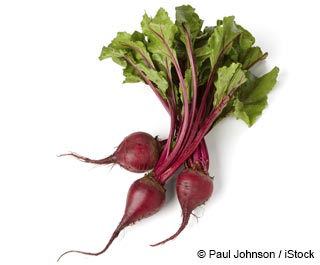The Buzz on Beet Greens
Botanical name: Beta vulgaris

Beet greens — also referred to as "chard" by Americans — originated from the Mediterranean region and eventually spread eastward. Chard has been documented as far back as Aristotle's time, with the Greek philosopher writing of red chard.1 Today, beet greens are grown throughout Asia and other regions of the world, and eaten as a salad green or potherb.2
Belonging to the Chenopodiaceae family,3 beets are categorized as dark green, leafy vegetables, or DGLVs. DGLVs are lauded for the high concentration of vitamins and minerals, especially vitamin A and iron. These two nutrients play vital roles in overall health and wellness.4
Because beet greens are a cool-season crop like Brussels sprouts and collards, they grow quickly and can survive almost freezing temperatures, making them a favorite of northern gardeners.5 Beets and their greens also enjoy a longer-than-normal growing season, with the plants easily producing new leaves after harvest.6
If you're going to add beet greens to your diet, you can store them for about 10 to 14 days in the refrigerator, but it's still best to eat them fresh. You can also freeze them to keep them longer. However, note that some nutrients may degrade after freezing.7
Health Benefits of Beet Greens
Besides supplying good amounts of protein, phosphorus and zinc, beet greens are a great source of fiber. Having adequate amounts of fiber in your diet will not only help digestion, but may also aid in weight control and lowering the risk of coronary heart disease and diabetes.8
Beet greens are high in magnesium, potassium, copper and manganese, and low in fat and cholesterol. As if that weren't enough, a 2012 study from Food and Nutrition Research has shown that the high levels of vitamin K may offer benefits for skeletal and nervous system health by helping regulate blood clotting and boosting bone strength.9 Compared to spinach and beetroot itself, beet greens contain higher levels of iron, which is essential for oxygen transport and DNA synthesis.10
The vitamin A content in beet greens helps strengthen the immune system by supporting the humoral immune processes. Vitamin A also plays an important role in maintaining eye health and promoting growth and development.11,12
Beet Greens Nutrition Facts
Serving Size: 3.5 ounces (100 grams), fresh
| Calories |
22 |
|
| Calories from Fat |
1 |
|
| Total Fat |
0 g |
|
| Saturated Fat |
0 g |
|
| Trans Fat |
|
|
| Cholesterol |
0 mg |
|
| Sodium |
226 mg |
|
| Total Carbohydrates |
4.33 g |
|
| Dietary Fiber |
3.7 g |
|
| Sugar |
0.5 g |
|
| Protein |
2.2 g |
|
| Calcium 117 mg |
Iron |
2.57 mg |
Beet Greens Healthy Recipes:
Roasted Beets and Sautéed Beet Greens
Use every part of your fresh beets and get two delicious side dishes.

|
Ingredients:
|
|
✓ 1 bunch beets with greens
|
✓ ¼ cup raw coconut oil
|
✓ 2 cloves garlic, minced
|
|
✓ 2 tablespoons chopped onions
|
✓ 1 tablespoons red wine vinegar
|
✓ Himalayan sea salt and pepper to taste
|
Procedure:
- Heat oven to 350 degrees Fahrenheit.
- Wash beets thoroughly, leaving skins on. (It's easier to peel the beets once they've been roasted.) Remove the greens and rinse, removing any large stems and set aside.
- Place beets in a small baking dish or roasting pan, toss with 2 tablespoons of coconut oil, cover and bake for 45 to 60 minutes or until tender. Serve with red wine vinegar or butter and salt and pepper.
- Heat remaining coconut oil in a skillet over medium-low heat. Add garlic and onion and cook for one minute. Tear the beet greens into 2- to 3-inch pieces, and add to skillet, stirring until wilted and tender. Season with salt and pepper.
(Adapted from AllRecipes.com)13
Beet Greens Fun Facts
Ancient civilizations, such as the Romans and Greeks, ate only beet greens. They reserved beetroots for medicinal purposes alone.14
Summary
Beets and their greens offer not only two great dishes for the table, but two sets of nutritional attributes as well. In the greens, vitamins A and K, especially, offer a plethora of benefits for the whole body, from your brain to your blood to your eyes. In the kitchen, beet greens can be enjoyed sautéed or as a salad.
Another way to get nutrients from beet greens is through juicing. Note however, that you will need to invest in a juicer.